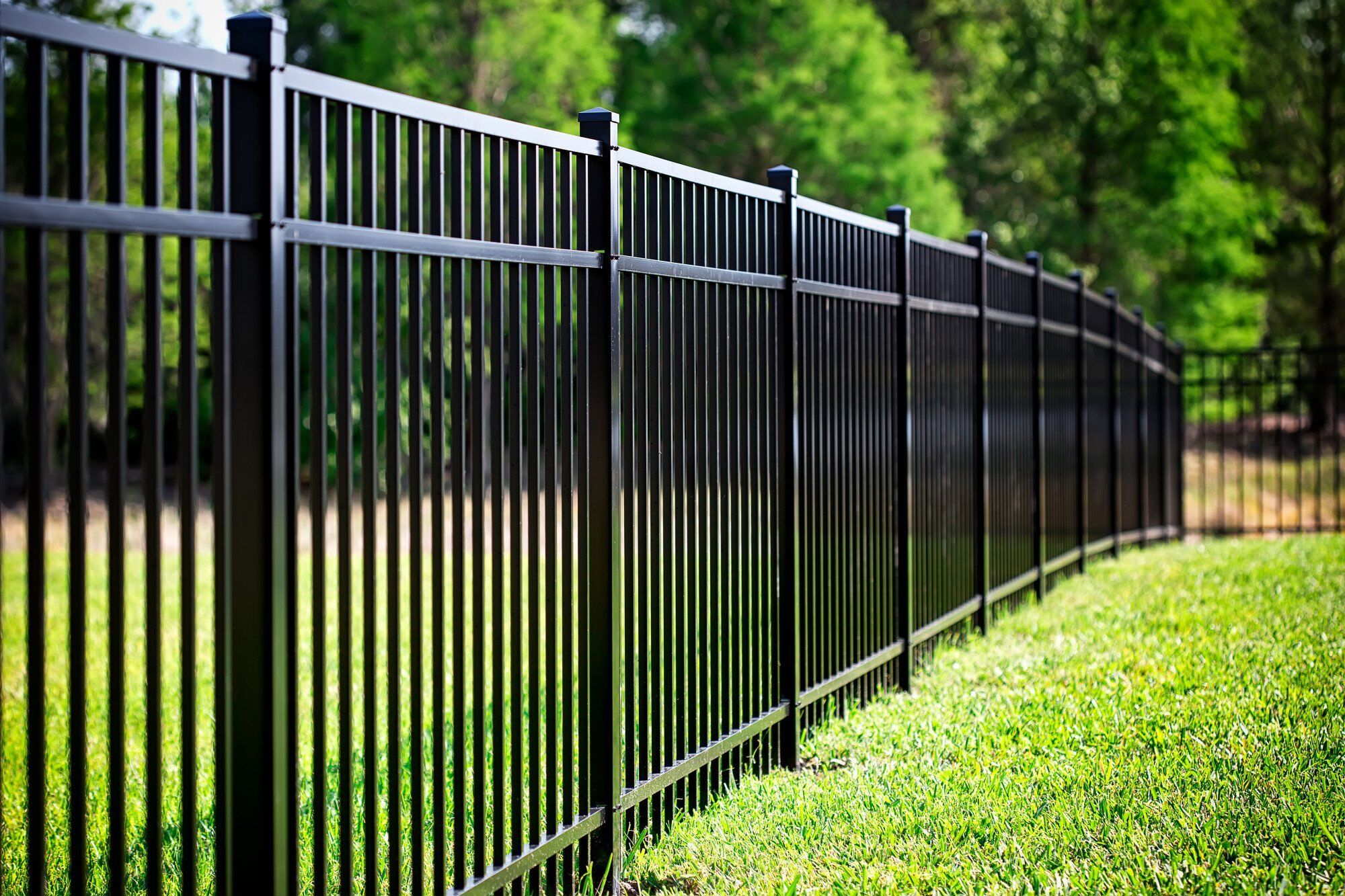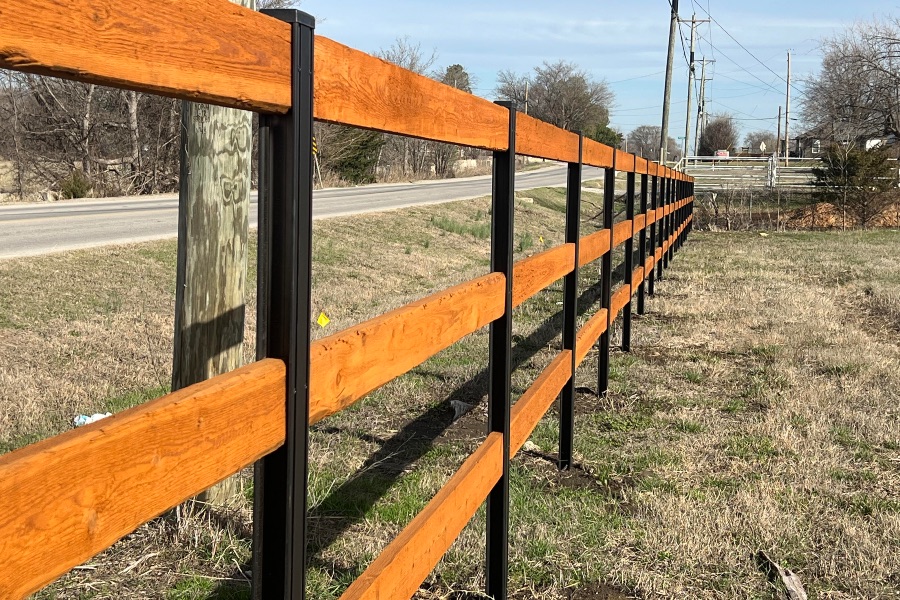All Categories
Featured
Picking the appropriate secure fencing material for your property is not simply about aesthetics; it has to do with durability, safety and security, and privacy. Whether you're aiming to enhance the beauty of your home or service, safeguard your residential property, or produce a private sanctuary, the product you choose will certainly play a considerable role in attaining your goals. With numerous fence choices available, it is essential to comprehend the benefits and downsides of each before making your choice.
Advantages:
All-natural Visual: Timber has a cozy, all-natural allure that improves the appearance of any residential property. Adjustable: Wood fencings can be painted, stained, or left neglected to attain various designs. Privacy: A high timber fencing can supply a high level of privacy for your home. Negative Aspects:
Maintenance Required: Timber fences call for regular upkeep, consisting of staining and securing to avoid damages from weather condition and pests. At risk to Climate: Timber can warp, rot, or end up being plagued with termites if not appropriately preserved. Much Shorter Life-span: Contrasted to products like plastic or steel, wood normally has a shorter life expectancy. Best For: House owners seeking a traditional, adjustable, and natural look.
![]()
Advantages:
Low Maintenance: Plastic doesn't need paint, discoloration, or securing. It's easy to clean with an easy hose pipe down. Durable: Immune to rot, termites, and weather condition, vinyl fencings last longer than timber fences. Variety of Styles: Available in many designs, shades, and textures to match any type of home. Negative Aspects:
Greater First Cost: The upfront expense of plastic fence is typically higher than timber or chain web link. Prone to Cracking: In extreme cold or with heavy impact, plastic fences can damage or split. Much less Adjustable: Unlike timber, vinyl provides less choices for paint or staining. Best For: Property owners or services searching for a low-maintenance, long-lasting, and long lasting fence option.
Benefits:
Stamina and Toughness: Metal fences are solid, resistant to put on, and resilient. Low Upkeep: Once mounted, metal fences require little upkeep, especially light weight aluminum, which stands up to rust. High Safety: Metal fencings are difficult to climb up and give an effective barrier against intruders. Disadvantages:
Price: Steel fences, especially wrought iron and steel, can be more pricey than various other choices. Corrosion and Rust: Steel fences, specifically, might rust without correct treatment. Aluminum is corrosion-resistant, yet wrought iron needs routine maintenance. Minimal Personal privacy: Steel fencings do not supply much privacy unless they are integrated with various other products, like wood slats or vinyl inserts. Best For: Those who prioritize security and longevity over privacy, or those with a high end property in requirement of a sophisticated, timeless fence.
Benefits:
Cost-efficient: Chain link is one of the most affordable fencing options offered. Reduced Maintenance: Once mounted, wire mesh fence call for little upkeep beyond occasional cleaning. Sturdy: Chain web link is solid and can last for many years if correctly kept. Negative Aspects:
![]()
Restricted Visual appeals: Wire mesh fence do not provide the visual allure of timber or wrought iron, and can look practical. Privacy Issues: Unless privacy slats or vinyl coatings are included, chain link fences do not provide much privacy. Less Secure in Some Areas: While chain web link supplies security, it can be quickly scaled or reduced if not installed with added safety and security functions. Best For: Commercial residential properties, huge homes, or areas where security is extra essential than aesthetic appeals.
Benefits:
Reduced Maintenance: Compound fences require no staining, securing, or painting. Resilience: Immune to insects, rot, and weather condition damage, composite fences last much longer than timber. Eco-Friendly: Several composite fencings are made from recycled products, making them a lasting alternative. Disadvantages:
Higher Expense: Composite fencings can be a lot more expensive than conventional wood or vinyl alternatives. Restricted Customization: While offered in various shades and designs, composite fences don't use the same personalization choices as timber fences. Heavy: Compound fence materials can be heavier than various other choices, making installment a lot more labor-intensive. Best For: Eco-conscious house owners or organizations looking for a low-maintenance, durable, and sustainable fence material.
Conclusion. Picking the ideal fence material for your property eventually depends on your priorities-- whether it's protection, personal privacy, appearances, or low maintenance. From traditional wood and budget-friendly chain web link to resilient vinyl and strong metal, each product provides distinct benefits suited to various requirements. By considering aspects like spending plan, installment time, maintenance requirements, and lasting durability, you can select the suitable fencing that meets your residential property's specific demands.
- Wood Secure fencing. Wood is one of one of the most preferred secure fencing materials due to its versatility, classic allure, and natural appearance. It's best for homes and can be made use of in a selection of designs, consisting of privacy fencings, picket fences, and post-and-rail fences.
Advantages:
All-natural Visual: Timber has a cozy, all-natural allure that improves the appearance of any residential property. Adjustable: Wood fencings can be painted, stained, or left neglected to attain various designs. Privacy: A high timber fencing can supply a high level of privacy for your home. Negative Aspects:
Maintenance Required: Timber fences call for regular upkeep, consisting of staining and securing to avoid damages from weather condition and pests. At risk to Climate: Timber can warp, rot, or end up being plagued with termites if not appropriately preserved. Much Shorter Life-span: Contrasted to products like plastic or steel, wood normally has a shorter life expectancy. Best For: House owners seeking a traditional, adjustable, and natural look.
- Vinyl (PVC) Fence. Vinyl fencings are a progressively preferred option because of their low maintenance and toughness. Made from synthetic materials, plastic fencings are immune to rot, decay, and pests. Readily available in a variety of styles and shades, vinyl secure fencing can be created to imitate the appearance of wood without the linked upkeep.

Advantages:
Low Maintenance: Plastic doesn't need paint, discoloration, or securing. It's easy to clean with an easy hose pipe down. Durable: Immune to rot, termites, and weather condition, vinyl fencings last longer than timber fences. Variety of Styles: Available in many designs, shades, and textures to match any type of home. Negative Aspects:
Greater First Cost: The upfront expense of plastic fence is typically higher than timber or chain web link. Prone to Cracking: In extreme cold or with heavy impact, plastic fences can damage or split. Much less Adjustable: Unlike timber, vinyl provides less choices for paint or staining. Best For: Property owners or services searching for a low-maintenance, long-lasting, and long lasting fence option.
- Steel Fence (Light Weight Aluminum, Steel, and Wrought Iron) Metal fences are recognized for their strength, safety and security, and visual worth. Aluminum, steel, and functioned iron fencings are frequently utilized in residential, industrial, and industrial setups, supplying high degrees of protection and a sophisticated appearance.
Benefits:
Stamina and Toughness: Metal fences are solid, resistant to put on, and resilient. Low Upkeep: Once mounted, metal fences require little upkeep, especially light weight aluminum, which stands up to rust. High Safety: Metal fencings are difficult to climb up and give an effective barrier against intruders. Disadvantages:
Price: Steel fences, especially wrought iron and steel, can be more pricey than various other choices. Corrosion and Rust: Steel fences, specifically, might rust without correct treatment. Aluminum is corrosion-resistant, yet wrought iron needs routine maintenance. Minimal Personal privacy: Steel fencings do not supply much privacy unless they are integrated with various other products, like wood slats or vinyl inserts. Best For: Those who prioritize security and longevity over privacy, or those with a high end property in requirement of a sophisticated, timeless fence.
- Chain Web Link Fence. Chain web link fencings are among one of the most functional and budget-friendly options readily available. Commonly utilized in commercial setups, they can also be an excellent option for properties, particularly if safety and security is a top concern. Chain link fences are available in various heights and can be personalized with personal privacy slats for added protection.
Benefits:
Cost-efficient: Chain link is one of the most affordable fencing options offered. Reduced Maintenance: Once mounted, wire mesh fence call for little upkeep beyond occasional cleaning. Sturdy: Chain web link is solid and can last for many years if correctly kept. Negative Aspects:

Restricted Visual appeals: Wire mesh fence do not provide the visual allure of timber or wrought iron, and can look practical. Privacy Issues: Unless privacy slats or vinyl coatings are included, chain link fences do not provide much privacy. Less Secure in Some Areas: While chain web link supplies security, it can be quickly scaled or reduced if not installed with added safety and security functions. Best For: Commercial residential properties, huge homes, or areas where security is extra essential than aesthetic appeals.
- Compound Fencing. Composite fences incorporate timber fibers and plastic to produce a durable, green alternative to standard wood fence. These fencings have the look of wood but require a lot less upkeep and are immune to rot, bugs, and fading.
Benefits:
Reduced Maintenance: Compound fences require no staining, securing, or painting. Resilience: Immune to insects, rot, and weather condition damage, composite fences last much longer than timber. Eco-Friendly: Several composite fencings are made from recycled products, making them a lasting alternative. Disadvantages:
Higher Expense: Composite fencings can be a lot more expensive than conventional wood or vinyl alternatives. Restricted Customization: While offered in various shades and designs, composite fences don't use the same personalization choices as timber fences. Heavy: Compound fence materials can be heavier than various other choices, making installment a lot more labor-intensive. Best For: Eco-conscious house owners or organizations looking for a low-maintenance, durable, and sustainable fence material.
Conclusion. Picking the ideal fence material for your property eventually depends on your priorities-- whether it's protection, personal privacy, appearances, or low maintenance. From traditional wood and budget-friendly chain web link to resilient vinyl and strong metal, each product provides distinct benefits suited to various requirements. By considering aspects like spending plan, installment time, maintenance requirements, and lasting durability, you can select the suitable fencing that meets your residential property's specific demands.
Latest Posts
Check Out the Best Auto Repair Offers in Montclare, Chicago
Published May 25, 25
1 min read
Recognizing When Your Car Needs Skilled Car Repair at Montclare Auto Repair
Published May 25, 25
1 min read
Secure Your Home with High Quality Residential Roof Covering
Published May 24, 25
1 min read